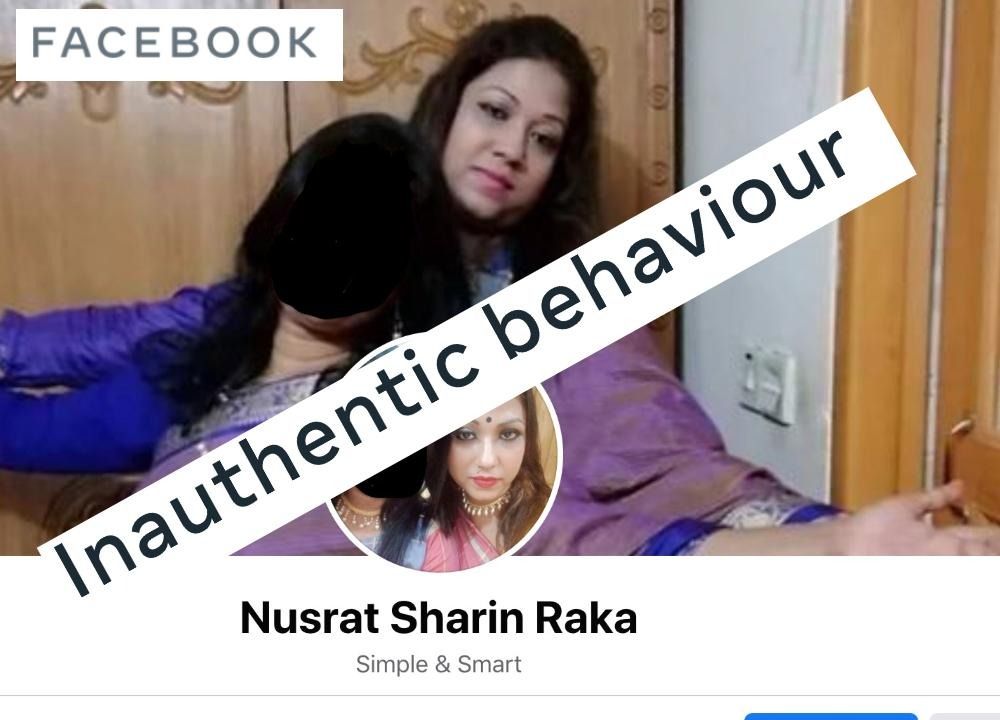Facebook: Account set up in the name of Kanak Sarwar’s sister removed for “inauthentic behaviour”
“The case against Nusrat Shahrin Raka was based on faked evidence,” says media watchdog.

A Facebook account set up in the name of the sister of an outspoken Bangladesh government critic has been removed by the social media platform for violating its policies on “inauthentic behaviour”, a Facebook spokesperson has confirmed.
“We have removed the account in question for violating our policies around inauthentic behaviour,” the spokesperson told Netra News, responding to a query about the account set up in the name of Nusrat Shahrin Raka, the sister of US-based Bangladeshi journalist Kanak Sarwar. “We believe in press freedom and in the right of activists to express themselves without fear for their safety or other repercussions. We continue to invest heavily to remove harmful content and bad actors from our platform.”
Facebook’s policy on inauthentic behaviour involves closing accounts of people who “misrepresent themselves on Facebook, use fake accounts, artificially boost the popularity of content or engage in behaviours designed to enable other violations under our community standards.”
Facebook’s statement to Netra News provides support to Nusrat Shahrin Raka’s contention that the account was fake, and raises questions about the foundation of the criminal case filed against her under the Digital Security Act by Bangladeshi law enforcement agencies.
“Now that it’s confirmed that the case against Nusrat Shahrin Raka was based on faked evidence, Bangladesh authorities should do the right thing: drop the criminal proceedings immediately and free Raka from detention,” Steven Butler, the Asia Program Coordinator for the Committee to Protect Journalists, told Netra News.
On October 1st, Nusrat Shahrin Raka informed her local police station in a General Diary that on September 29th someone had set up a fake Facebook profile in her name containing anti-government posts, which she had nothing to do with. Four days later, Raka was arrested for using that same account to “spread false, misleading, and defamatory statements against the state and important state officials.”
A magistrate remanded her in police custody for five days and following that on October 10th refused her bail and sent her to prison.
Raka is the sister of Kanak Sarwar, an exiled dissident journalist living in the United States who runs a popular Bengali language YouTube channel which posts interviews with critics of the Bangladesh government. He says that his sister is not involved in politics and her arrest is part of Bangladesh government’s attempts “to stop my criticism, and my movement for democracy and press freedom. It is very nasty.”
“Kanak Sarwar has repeatedly said that his sister is not involved in his work, and that she had complained to the police about a Facebook page that falsely purported to be hers,” Meenakshi Ganguly, the South Asia director at Human Rights Watch, told Netra News. “Instead of investigating her complaint and identifying who tried to set her up like this, she has been jailed. It almost appears that the authorities are targeting her because they don’t like her brother’s work.”
Facebook did not provide details of who set up the Facebook profile, but in December 2020 the platform identified and disrupted a network engaging in coordinated inauthentic behaviours in Bangladesh. In December 2018, Facebook took down a state-linked network working to compromise the accounts of Bangladeshi journalists and human rights defenders.
In the second quarter of 2021, Facebook says that globally it has removed 1.7 billion fake accounts on Facebook, 99.8% of which it says they detected before they were reported using advanced machine learning.●